The Kingdom of Back Read online
Page 10
It would be difficult for us to sneak around her.
“We have nothing with which to hold the water,” Woferl said. “I am only wearing my nightclothes. We have no shoes, or thick aprons to use as a vessel.”
The witch frowned for a moment at this problem.
“Perhaps we can use one of the night flowers behind you,” I suggested. I pointed toward them. “They are very large. They may be able to hold enough water.”
Her eyes lit up. “Yes,” she said. “You’re right, clever girl.” She twisted herself around in place, bent toward the wall behind her, and picked one of the night flowers from the wall. It glowed more brightly in her hand, perhaps in fear, and I saw its thorny stem move slowly in her grasp. Woferl watched it with wide eyes.
I started to move toward her. I could see her wrinkles more plainly now, the circles under her eyes, the creases and folds, the frailness of her skin. She continued to smile at me.
“Nannerl,” she whispered as I drew closer. The night flower glittered in her hand. “Help me escape from this grotto, and I shall repay you in ways you cannot imagine. I can answer your wish. I can keep you from being forgotten, like I have been.”
I swallowed hard. “How do you know about my wish?” I said. My eyes darted toward Woferl.
“Your brother can’t hear me, Nannerl,” the witch said. “Only you can. I know who you are, and I know what you want. If you free me, I can help you.”
I was so close now that the cold blue light of the night flower reflected against my skin. The witch’s eyes bore into mine. “Did Hyacinth tell you?” I asked her. “He must have mentioned it.”
Her lips turned down in a menacing frown. “You sound like you’re very fond of him.”
I hesitated, unsure whether I should answer her.
“And what is it that makes you so fond?” she said. The sweet violins in her voice now turned bitter, the nostalgia shifting into a dark memory.
“Should I not be?” I asked her. A seedling of doubt against Hyacinth was planted in my mind. Careful what she says to you, I reminded myself, alarmed.
“That isn’t something I can tell you. Do you trust him?”
“I don’t know.”
She held out the flower to me. “You would do well to trust me instead, Nannerl.”
I took a deep breath. Behind me, Woferl stood unmoving beside the cavern pool. I turned back to the faery, reached out, and took the night flower from her hand.
Her touch, colder than the wind of a winter night, froze me in place. I wanted to cry out. Instead I found myself staring at her, overwhelmed by the sound of music that came from deep in her throat. The melody flowed through her body and into my hand, wrapping itself around my skin, refusing to let go. I closed my eyes, unable to tear myself away from her.
I wanted to be a part of the music so badly, ached for it to swallow me. It sounded like it came from everywhere—from her throat, from the air, from deep inside me. But the ice of her touch turned to fire. It threatened to scorch me from the inside out, until I turned to ash against the walls.
Woferl’s voice came from somewhere far away, another time and place. “Nannerl!” I thought he said. I could not move. The music roared in my ears.
The white of the witch’s eyes had completely filled with blackness. She did not smile any longer. The music that flowed in me turned deafening, shaking my limbs. Pain shot through my chest. It was too much.
Then I felt a warm hand grab mine and pull me away. I gasped for air. My other hand stayed locked around the night flower. I glanced around in a daze and realized that Woferl had broken her hold on me and was running with me toward the pool.
Behind us, the witch shrieked.
“Help me!” she screamed. “Fill the night flower with water, and pour it on my feet. Free me!”
Such anguish pierced her voice that a part of me yearned to go back to the music that flowed in her. My heart tugged against her magic. No. I struggled against it, then forced myself away with all my strength. The witch tried to lunge toward us, but we were too far now, and diving back into the water where she could not reach, where her grounded feet prevented her from following. The warmth of the water washed away the last of her icy magic’s pull.
The instant we plunged into the pool, I lost my grip on the night flower. Woferl saw it happen and grabbed it. We swam away from the grotto and out through the crevice, where we could no longer hear the witch’s cries. We swam away from the rocks, back toward where the deep blue ocean became shallow and hugged the edges of the beach’s white sands, away from the cave of night flowers.
Hyacinth was standing exactly where we had last seen him. I trembled as he approached us. Water dripped from my eyes and down my face. Woferl shivered beside me, clutching the flower to his chest. When the princeling saw the night flower in my brother’s hands, his eyes lit up and he let out a laugh of joy.
“Splendid!” he exclaimed. He gingerly took the night flower from Woferl’s hands, then patted my brother’s cheeks twice in affection. “You’ve done very well.”
Woferl beamed, pleased at his praise, and wrapped his arms around himself with pride.
“Why do you need the flower?” I asked Hyacinth.
He glanced at me, then leaned down very close and kissed my cheek. His smile was sweet and grateful. “It is part of what I need to reclaim my throne in this kingdom,” he replied. “Soon you will see.”
I frowned. “I don’t understand.”
But Hyacinth had already turned away and motioned for us to follow him back into the woods. I looked down at Woferl again. He seemed tired, and his long lashes dripped water. A bright spot of blood pooled on his thumb. He had pricked his finger on the flower’s thorns.
* * *
I woke with a start. Gone were the ocean and the faery queen and the night flower. Gone was the princeling. I was lying in my own bed with Woferl breathing gently next to me, his eyes quivering ever so slightly underneath his lids. He had one of his thumbs in his mouth, a habit that returned whenever he dreamed. I stared at the ceiling.
A dream. The words echoed in my mind. But it had all felt so vibrant. The shore had been so white, the shells so blue, the water so warm. The witch’s eyes so dark. Still, it must have been a dream. Had to have been. What had Hyacinth said he needed the flower for? I couldn’t remember. Nor could I think of what we had done after we surfaced again. Hyacinth had praised us, hadn’t he?
I looked at Woferl again, then gently pulled his thumb out of his mouth. There, along the top of the tender flesh, was a small cut and a drop of blood. He must have bitten his thumb a little too hard during the night, I thought.
But the vision of the night flower’s thorns and Hyacinth’s smile had not yet faded away. I continued to stare at my brother until the room began to blur again, until this time I sank into a dreamless sleep.
THE CASTLE ON THE HILL
Woferl seemed quieter than usual the next morning. He lay in bed beside me, round cheeks flushed, sleep still glazing his eyes, and listened without a word as I told him about my dream.
“We went together to the white sand beach,” I said. “We saw the Queen of the Night, a witch trapped in an underwater grotto there. She was very frightening.”
Woferl murmured his astonishment as I told him about how we escaped from the grotto and ended up giving the night flower to Hyacinth. But his wonder felt muted, his attention scattered. The glaze in his eyes gave them a feverish shine.
“Are you all right, Woferl?” I asked when I finished my story.
He shrugged and curled up tighter in bed. I glimpsed a tiny scar on his thumb from where he’d bitten it in his sleep. “My throat is just a little dry,” he said, and dozed off again.
Papa always left early and did not come back until later in the day, when Woferl switched from practicing on his violin to the clavier. So the morning hours
were mine, a time when I could play without being disturbed, when no one came in to check on my progress or how many times I had run flawlessly through a menuett.
Mama was out, so the only person with me this morning was Woferl. Now that he knew about my composition, and had managed to keep it from Papa, I felt safer with him nearby, someone with whom I could share the burden of a secret. He sat with me on the clavier’s bench, his elbows propped up on the keys, watching intently as I played my scale.
After I paused to turn to a different piece in my notebook, he said to me, quite abruptly, “I wish you would write more music.”
I stopped to look at him.
Woferl flipped to the second to last page of my notebook, and pointed out the few measures I’d written. “You never finished this one,” he said.
All I could hear was my father’s voice in my head, and the words he’d spoken to Mama over dinner yesterday. Nannerl makes an excellent companion for Woferl. Together their fame is twice what it could be. Can you imagine the spectacle we could create if one day Nannerl performed one of Woferl’s compositions?
Mama had listened and nodded. Of course, it would be preposterous to suggest that I could compose my own pieces.
In truth, I was an excellent companion. But I would be nothing more than a performer for my brother’s compositions. If I wanted immortality, it would not come from my writing. The words hung weighted around my neck. Composition was for men. It was an obvious rule. What would others think of my father if they knew I composed behind his back? That he could not even control his own daughter? What kind of girl shamed her father by secretly doing a man’s work?
The image of my compositions burning in the fire flashed before me, the thought of my father’s stern eyes . . . I had seen Papa toss letters in a rage into the stove, remembered watching the embers light the edges of those papers. The memory made me wince. Even seeing my little tune exposed here on the page was making my heart quicken. I glanced nervously toward the door, half expecting Papa to step in at this very moment, and then turned to a different menuett.
“I can’t,” I replied to Woferl.
He frowned. “Why not?” he asked.
“I’m afraid to.”
“But don’t you want to?”
“Of course, but it is different with me.”
“Music is music. The source of it does not matter so much.”
I sighed. “Woferl,” I chided him, and he had the grace to give me a guilty look. “I cannot do what you do. It is something you will never ever understand.”
He pouted at me in frustration. His tongue had sharpened when it came to composition. Everyone fancies himself a musician, he’d complained to me. No one respects the soul of it. I’d seen him turn Papa’s face red with embarrassment when he once scoffed at the skills of a local noble who had given composition, in his words, a whirl.
Charlatan, Woferl had called him to his face. I would have been reprimanded harshly for saying such a thing to a nobleman, but Papa just chuckled about it later.
My brother did not reply again. Instead, he hurried off, and I returned to my lessons.
Minutes later, he returned with a quill and inkwell.
“Woferl!” I exclaimed, pausing in my playing. But he did not apologize. Instead, he adjusted the writing instruments and pointed the quill’s feather in my direction.
I began to tremble at the sight of it. This was not Woferl at work. This was God taunting me, tempting me to write again. Or, perhaps, it was Hyacinth, his will bubbling up from my brother’s sweet eyes. Was I hearing the words of the princeling on Woferl’s lips?
“Will you do it?” he whispered eagerly to me.
“Woferl, this is Papa’s,” I said. “How will we explain that it is not in its place?”
Woferl simply closed the notebook and gestured to a loose sheet propped against the clavier stand. “I have started to write,” he said. “Papa will know the ink is here because I use it daily. How would he know about you?”
I felt my cheeks grow warm at the thought. “But, Woferl,” I protested. “Where will I write mine? I cannot continue to compose in my notebook. Sooner or later Papa will see, and that will be the end of it.”
“Write on loose sheets,” he said. “Then you can fold them up and hide them in our bedroom.”
My music, my measures, each one painstakingly written, curling into ash in the fire. The fear lingered, holding me back. But my brother’s eyes were still on me, and with them, I felt the ache again to write, his encouragement pushing me forward.
If Papa discovered I was composing, he might burn my work as he burned the letters that upset him.
But he couldn’t do that if he never found it.
Woferl finally shrugged, impatient with my long hesitation, and wandered off to continue his own compositions. I stayed at the bench and stared at the quill in silence, thinking. Ink dripping down the side of the well had touched the clavier stand, staining the fibers of the blank parchment.
* * *
In the mornings I would find the quill and inkwell on the stand, along with the smudged pages of music that Woferl had composed the afternoon before. Papa saw them in the evenings and would show them to me in a merry temper, as if I did not know what they sounded like.
Woferl was right. Our father had no reason to think that I would also compose. Every morning, when he was not at home and Mama had left for errands, when only Woferl and I were in the music room, I would take the folded sheet of music from the bottom of my bedroom drawers and add measures to it.
My pages were not as clean as Woferl’s. Under Papa’s watchful guidance, Woferl wrote more than I did. He composed so quickly, in fact, that he produced stacks of paper at the end of every day. Mama was constantly sending Sebastian out to buy more sheets. When I looked at my brother’s pages, I would marvel at how sparse his changes were, how much of it already seemed fully formed in his head.
My thoughts shifted more. I would write entire lines and then cross them out. I would take a measure of music and then flip the harmony to see how it worked. I would go over and over a page before I finally produced a finished copy of it. At the end of the day, my work would bleed with ink, a mess of moving thoughts that, to me, told a story of how the music came to be. I would run a hand over the dried notes and hear the early drafts in my head. My heart would keep time with the rise and fall of the melody. In those moments, the room around me faded away. My surroundings changed into a secret world of sound and peace. I would stir out of that dream of creation with tears in my eyes.
Woferl often watched me write. Sometimes he asked me questions, but mostly he sat beside me in silence, his chin propped in his hands as I worked. When he wrote his pieces, I could hear traces of my own style filtering into his, like milk curling into tea.
Woferl’s handwriting, childish though it was, looked very much like our father’s with its coiled tails. Mine, untrained and unrefined, did not. From what my brother shared with me about his lessons with Papa, I learned the proper format for recording my work. Eventually, my writing began to look as polished as my brother’s, nearly identical to his hand.
In case Papa discovered the sheets of music in my drawer, he could assume that they belonged to Woferl. And I would be spared.
* * *
Then, several weeks after my dream of the night flower, Woferl fell ill.
At first, he coughed a little at night, nothing much, only enough to wake me for a moment. Shortly after, his skin began to look paler than it usually did. One morning I went to the clavier and found Woferl sound asleep by the windowsill, his breath forming a circle of fog against the glass. The tiny wound on his thumb still had not disappeared, and the skin around it was flushed and pink, hot to the touch. He did not even wake when I shook him. It was only when I began to play that he finally sat up and looked around, dazed.
“Oh, Nannerl, it’s
you,” he said when he saw me. Then he turned, his eyes far away, and touched the window’s glass with his small fingers. “Hyacinth was outside.”
I looked down at the street, half expecting to see the princeling’s familiar smile. But nothing was there. The hairs on my arms rose. Perhaps Hyacinth was appearing to Woferl alone, as he sometimes did to me. What did he want with him?
At first, my parents did not dwell on Woferl’s bout of sickness. Children tended to catch illnesses, especially in these cooler months, and Woferl had always been a frail child.
But the illness lingered. It worsened. His dark eyes turned bright with fever, and his delicate skin gleamed with sweat and angry, red bumps.
Papa did not sleep on the first few nights that Woferl’s rash broke out. He sat in our bedchamber and looked on with a grim face as Mama patted my brother’s forehead with a damp cloth. As the illness hung on, he began to pace.
“I have had to cancel a performance already,” he said in a low voice to my mother. “Soon we will cancel a second, and for the Postmaster-General Count Wenzel Paar, no less.”
“The count can wait.” There was an edge to Mama’s voice tonight. “Woferl will recover before you know it, and you can resume your schedule.”
Papa frowned. “The archbishop has already cut my salary. Four hundred gulden! How is a family to live on four hundred gulden a year? We can’t afford to cancel a third.”
“Well, you will just have to wait, won’t you?” Mama answered.
Papa turned away from her in a huff. As he passed me, he paused. “If Woferl is not well by next week,” he said, “you will have to perform alone.”

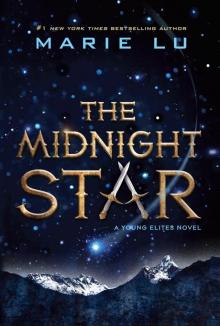 The Midnight Star
The Midnight Star Legend
Legend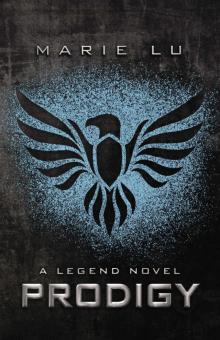 Prodigy
Prodigy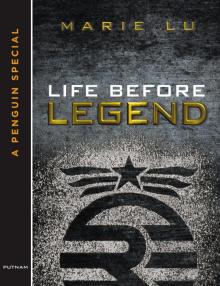 Life Before Legend
Life Before Legend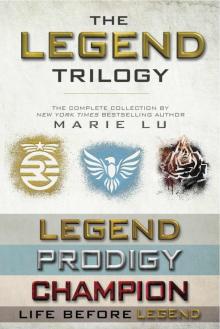 Legend Trilogy Boxed Set
Legend Trilogy Boxed Set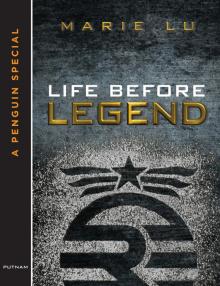 Life Before Legend: Stories of the Criminal and the Prodigy
Life Before Legend: Stories of the Criminal and the Prodigy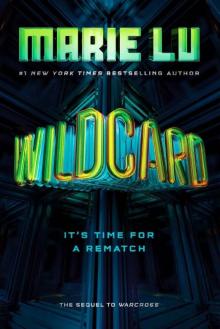 Wildcard
Wildcard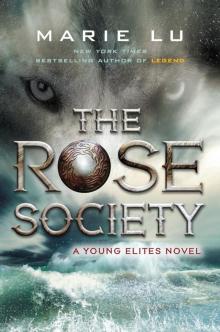 The Rose Society
The Rose Society Warcross
Warcross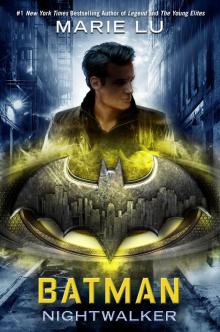 Batman: Nightwalker
Batman: Nightwalker Skyhunter
Skyhunter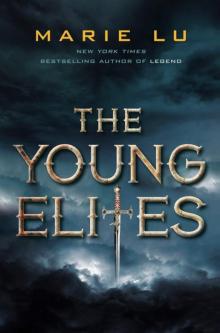 The Young Elites
The Young Elites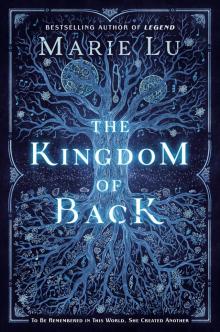 The Kingdom of Back
The Kingdom of Back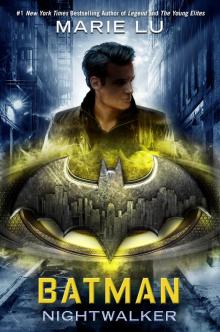 Batman
Batman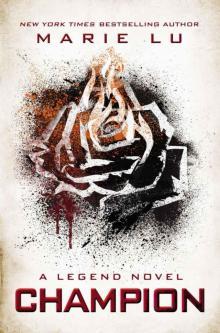 Champion: A Legend Novel
Champion: A Legend Novel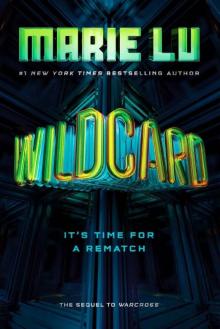 Wildcard (Warcross)
Wildcard (Warcross)